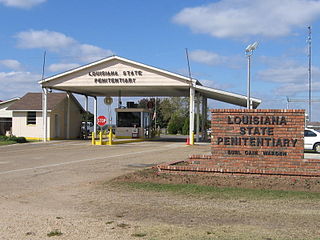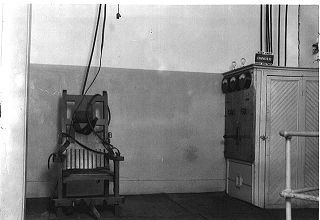Related Research Articles

The electric chair is a specialized device employed for carrying out capital punishment through the process of electrocution. During its use, the individual sentenced to death is securely strapped to a specially designed wooden chair and electrocuted via strategically positioned electrodes affixed to the head and leg. This method of execution was conceptualized by Alfred P. Southwick, a dentist based in Buffalo, New York, in 1881. Over the following decade, this execution technique was developed further, aiming to provide a more humane alternative to the conventional forms of execution, particularly hanging. The electric chair was first utilized in 1890 and subsequently became known as a symbol of this method of execution.

In the United States, capital punishment is a legal penalty throughout the country at the federal level, in 27 states, and in American Samoa. It is also a legal penalty for some military offenses. Capital punishment has been abolished in 23 states and in the federal capital, Washington, D.C. It is usually applied for only the most serious crimes, such as aggravated murder. Although it is a legal penalty in 27 states, 19 states currently have the ability to execute death sentences, with the other 7, as well as the federal government and military, being subject to different types of moratoriums.

Capital punishment is a legal penalty in the U.S. state of Louisiana.
Capital punishment is a legal penalty in the U.S. state of Arkansas.

Capital punishment is a legal penalty in the U.S. state of Ohio, although all executions have been suspended indefinitely by Governor Mike DeWine until a replacement for lethal injection is chosen by the Ohio General Assembly. The last execution in the state was in July 2018, when Robert J. Van Hook was executed via lethal injection for murder.
Capital punishment is a legal penalty in the U.S. state of Nebraska. In 2015, the state legislature voted to repeal the death penalty, overriding governor Pete Ricketts' veto. However, a petition drive secured enough signatures to suspend the repeal until a public vote. In the November 2016 general election, voters rejected the repeal measure, preserving capital punishment in the state. Nebraska currently has 12 inmates on death row.
Capital punishment is a legal penalty in the U.S. state of Oklahoma.

Old Sparky is the nickname of the electric chairs in Arkansas, Connecticut, Florida, Georgia, Illinois, Kentucky, Nebraska, New York, Ohio, Oklahoma, South Carolina, Texas, Virginia, and West Virginia. Old Smokey was the nickname of the electric chairs used in New Jersey, Pennsylvania, and Tennessee. "Old Sparky" is sometimes used to refer to electric chairs in general, and not one of a specific state.

The use of capital punishment by the United States military is a legal punishment in martial criminal justice. Despite its legality, capital punishment has not been imposed by the U.S. military in over sixty years.
Capital punishment in Connecticut formerly existed as an available sanction for a criminal defendant upon conviction for the commission of a capital offense. Since the 1976 United States Supreme Court decision in Gregg v. Georgia until Connecticut repealed capital punishment in 2012, Connecticut had only executed one person, Michael Bruce Ross in 2005. Initially, the 2012 law allowed executions to proceed for those still on death row and convicted under the previous law, but on August 13, 2015, the Connecticut Supreme Court ruled that applying the death penalty only for past cases was unconstitutional.

Capital punishment is a legal penalty in the U.S. state of Florida.

Capital punishment is a legal penalty in the U.S. state of Mississippi.
Capital punishment is a legal penalty in the U.S. state of Georgia. Georgia reintroduced the death penalty in 1973 after Furman v. Georgia ruled all states' death penalty statutes unconstitutional. The first execution to take place afterwards occurred in 1983.
Capital punishment is a legal penalty in the U.S. state of South Carolina. Between 1718 and 2021, more than 680 people have been executed in South Carolina. After the nationwide capital punishment ban was overturned in 1976, South Carolina has executed 43 people.
Capital punishment is a legal punishment in Tennessee.

Carey Dean Moore was a convicted murderer, executed by lethal injection by the state of Nebraska. It was the first execution in Nebraska using lethal injection, and the state's first execution since 1997. The execution was the first in the United States to use fentanyl.
References
- ↑ "Execution Database". Death Penalty Information Center . Retrieved June 7, 2023.
- ↑ "NDCS carries out execution of Carey Dean Moore | NDCS - Nebraska Department of Correctional Services". corrections.nebraska.gov. Lincoln, Nebraska. 14 August 2018. Retrieved 15 August 2018.
- ↑ "Inmate Details: 31861 -- Robert Williams". Nebraska Department of Correctional Services. Retrieved August 17, 2007.
- ↑ Matthew Waite (3 December 1997). "Williams marks state's third electrocution". Daily Nebraskan. Archived from the original on 27 Oct 2007. Retrieved 4 February 2014.
- ↑ "The Execution of Cyrus Tator," NorthOmahaHistory.com.